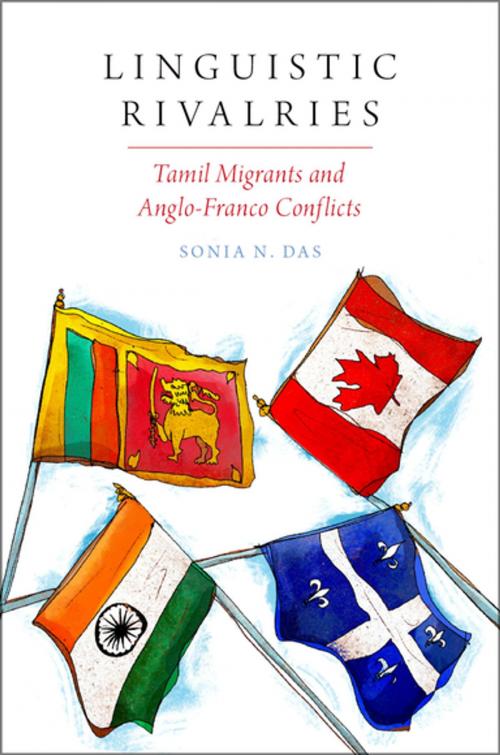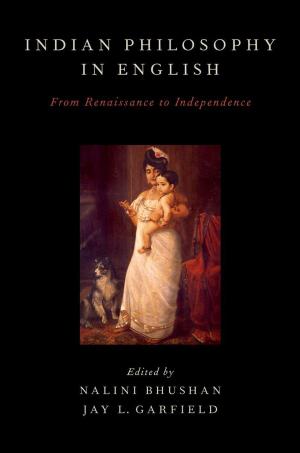Linguistic Rivalries
Tamil Migrants and Anglo-Franco Conflicts
Nonfiction, History, Asian, India, Canada, Reference & Language, Language Arts, Linguistics| Author: | Sonia N. Das | ISBN: | 9780190675448 |
| Publisher: | Oxford University Press | Publication: | October 27, 2016 |
| Imprint: | Oxford University Press | Language: | English |
| Author: | Sonia N. Das |
| ISBN: | 9780190675448 |
| Publisher: | Oxford University Press |
| Publication: | October 27, 2016 |
| Imprint: | Oxford University Press |
| Language: | English |
Linguistic Rivalries weaves together anthropological accounts of diaspora, nation, and empire to explore and analyze the multi-faceted processes of globalization characterizing the migration and social integration experiences of Tamil-speaking immigrants and refugees from India and Sri Lanka to Montréal, Québec in the late twentieth and early twenty-first centuries. In Montréal, a city with more trilingual speakers than in any other North American city, Tamil migrants draw on their multilingual repertoires to navigate longstanding linguistic rivalries between anglophone and francophone, and Indian and Sri Lankan nationalist leaders by arguing that Indians speak "Spoken Tamil" and Sri Lankans speak "Written Tamil" as their respective heritage languages. Drawing on ethnographic, archival, and linguistic methods to compare and contrast the communicative practices and language ideologies of Tamil heritage language learning in Hindu temples, Catholic churches, public schools, and community centers, this book demonstrates how processes of sociolinguistic differentiation are mediated by ethnonational, religious, class, racial, and caste hierarchies. Indian Tamils showcase their use of the "cosmopolitan" sounds and scripts of colloquial varieties of Tamil to enhance their geographic and social mobilities, whereas Sri Lankan Tamils, dispossessed of their homes by civil war, instead emphasize the "primordialist" sounds and scripts of a pure "literary" Tamil to rebuild their homeland and launch a "global" critique of racism and environmental destruction from the diaspora. This book uses the ethnographic and archival study of Tamil mobility and immobility to expose the mutual constitution of elite and non-elite global modernities, defined as language ideological projects in which migrants objectify dimensions of time and space through scalar metaphors.
Linguistic Rivalries weaves together anthropological accounts of diaspora, nation, and empire to explore and analyze the multi-faceted processes of globalization characterizing the migration and social integration experiences of Tamil-speaking immigrants and refugees from India and Sri Lanka to Montréal, Québec in the late twentieth and early twenty-first centuries. In Montréal, a city with more trilingual speakers than in any other North American city, Tamil migrants draw on their multilingual repertoires to navigate longstanding linguistic rivalries between anglophone and francophone, and Indian and Sri Lankan nationalist leaders by arguing that Indians speak "Spoken Tamil" and Sri Lankans speak "Written Tamil" as their respective heritage languages. Drawing on ethnographic, archival, and linguistic methods to compare and contrast the communicative practices and language ideologies of Tamil heritage language learning in Hindu temples, Catholic churches, public schools, and community centers, this book demonstrates how processes of sociolinguistic differentiation are mediated by ethnonational, religious, class, racial, and caste hierarchies. Indian Tamils showcase their use of the "cosmopolitan" sounds and scripts of colloquial varieties of Tamil to enhance their geographic and social mobilities, whereas Sri Lankan Tamils, dispossessed of their homes by civil war, instead emphasize the "primordialist" sounds and scripts of a pure "literary" Tamil to rebuild their homeland and launch a "global" critique of racism and environmental destruction from the diaspora. This book uses the ethnographic and archival study of Tamil mobility and immobility to expose the mutual constitution of elite and non-elite global modernities, defined as language ideological projects in which migrants objectify dimensions of time and space through scalar metaphors.















